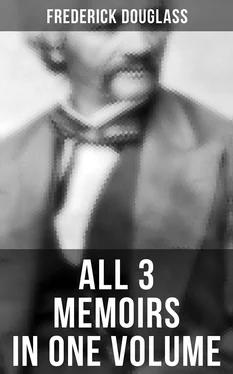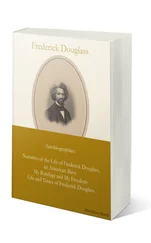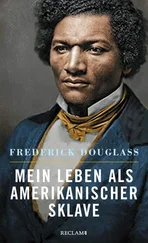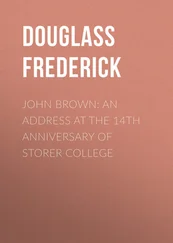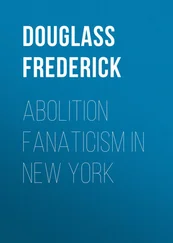The frequent hearing of my mistress reading the bible for she often read aloud when her husband was absent soon awakened my curiosity in respect to this mystery of reading, and roused in me the desire to learn. Having no fear of my kind mistress before my eyes, (she had then given me no reason to fear,) I frankly asked her to teach me to read; and, without hesitation, the dear woman began the task, and very soon, by her assistance, I was master of the alphabet, and could spell words of three or four letters. My mistress seemed almost as proud of my progress, as if I had been her own child; and, supposing that her husband would be as well pleased, she made no secret of what she was doing for me. Indeed, she exultingly told him of the aptness of her pupil, of her intention to persevere in teaching me, and of the duty which she felt it to teach me, at least to read the bible . Here arose the first cloud over my Baltimore prospects, the precursor of drenching rains and chilling blasts.
Master Hugh was amazed at the simplicity of his spouse, and, probably for the first time, he unfolded to her the true philosophy of slavery, and the peculiar rules necessary to be observed by masters and mistresses, in the management of their human chattels. Mr. Auld promptly forbade continuance of her instruction; telling her, in the first place, that the thing itself was unlawful; that it was also unsafe, and could only lead to mischief. To use his own words, further, he said, “if you give a nigger an inch, he will take an ell;” “he should know nothing but the will of his master, and learn to obey it.” “if you teach that nigger—speaking of myself—how to read the bible, there will be no keeping him;” “it would forever unfit him for the duties of a slave;” and “as to himself, learning would do him no good, but probably, a great deal of harm—making him disconsolate and unhappy.” “If you learn him now to read, he’ll want to know how to write; and, this accomplished, he’ll be running away with himself.” Such was the tenor of Master Hugh’s oracular exposition of the true philosophy of training a human chattel; and it must be confessed that he very clearly comprehended the nature and the requirements of the relation of master and slave. His discourse was the first decidedly anti-slavery lecture to which it had been my lot to listen. Mrs. Auld evidently felt the force of his remarks; and, like an obedient wife, began to shape her course in the direction indicated by her husband. The effect of his words, on me , was neither slight nor transitory. His iron sentences—cold and harsh—sunk deep into my heart, and stirred up not only my feelings into a sort of rebellion, but awakened within me a slumbering train of vital thought. It was a new and special revelation, dispelling a painful mystery, against which my youthful understanding had struggled, and struggled in vain, to wit: the white man’s power to perpetuate the enslavement of the black man. “Very well,” thought I; “knowledge unfits a child to be a slave.” I instinctively assented to the proposition; and from that moment I understood the direct pathway from slavery to freedom. This was just what I needed; and I got it at a time, and from a source, whence I least expected it. I was saddened at the thought of losing the assistance of my kind mistress; but the information, so instantly derived, to some extent compensated me for the loss I had sustained in this direction. Wise as Mr. Auld was, he evidently underrated my comprehension, and had little idea of the use to which I was capable of putting the impressive lesson he was giving to his wife. He wanted me to be a slave; I had already voted against that on the home plantation of Col. Lloyd. That which he most loved I most hated; and the very determination which he expressed to keep me in ignorance, only rendered me the more resolute in seeking intelligence. In learning to read, therefore, I am not sure that I do not owe quite as much to the opposition of my master, as to the kindly assistance of my amiable mistress. I acknowledge the benefit rendered me by the one, and by the other; believing, that but for my mistress, I might have grown up in ignorance.
I had resided but a short time in Baltimore, before I observed a marked difference in the manner of treating slaves, generally, from which I had witnessed in that isolated and out-of-the-way part of the country where I began life. A city slave is almost a free citizen, in Baltimore, compared with a slave on Col. Lloyd’s plantation. He is much better fed and clothed, is less dejected in his appearance, and enjoys privileges altogether unknown to the whip-driven slave on the plantation. Slavery dislikes a dense population, in which there is a majority of non-slaveholders. The general sense of decency that must pervade such a population, does much to check and prevent those outbreaks of atrocious cruelty, and those dark crimes without a name, almost openly perpetrated on the plantation. He is a desperate slaveholder who will shock the humanity of his non-slaveholding neighbors, by the cries of the lacerated slaves; and very few in the city are willing to incur the odium of being cruel masters. I found, in Baltimore, that no man was more odious to the white, as well as to the colored people, than he, who had the reputation of starving his slaves. Work them, flog them, if need be, but don’t starve them. These are, however, some painful exceptions to this rule. While it is quite true that most of the slaveholders in Baltimore feed and clothe their slaves well, there are others who keep up their country cruelties in the city.
An instance of this sort is furnished in the case of a family who lived directly opposite to our house, and were named Hamilton. Mrs. Hamilton owned two slaves. Their names were Henrietta and Mary. They had always been house slaves. One was aged about twenty-two, and the other about fourteen. They were a fragile couple by nature, and the treatment they received was enough to break down the constitution of a horse. Of all the dejected, emaciated, mangled and excoriated creatures I ever saw, those two girls—in the refined, church going and Christian city of Baltimore were the most deplorable. Of stone must that heart be made, that could look upon Henrietta and Mary, without being sickened to the core with sadness. Especially was Mary a heart-sickening object. Her head, neck and shoulders, were literally cut to pieces. I have frequently felt her head, and found it nearly covered over with festering sores, caused by the lash of her cruel mistress. I do not know that her master ever whipped her, but I have often been an eye witness of the revolting and brutal inflictions by Mrs. Hamilton; and what lends a deeper shade to this woman’s conduct, is the fact, that, almost in the very moments of her shocking outrages of humanity and decency, she would charm you by the sweetness of her voice and her seeming piety. She used to sit in a large rocking chair, near the middle of the room, with a heavy cowskin, such as I have elsewhere described; and I speak within the truth when I say, that these girls seldom passed that chair, during the day, without a blow from that cowskin, either upon their bare arms, or upon their shoulders. As they passed her, she would draw her cowskin and give them a blow, saying, “move faster, you black jip!” and, again, “take that, you black jip!” continuing, “if you don’t move faster, I will give you more.” Then the lady would go on, singing her sweet hymns, as though her righteous soul were sighing for the holy realms of paradise.
Added to the cruel lashings to which these poor slave-girls were subjected—enough in themselves to crush the spirit of men—they were, really, kept nearly half starved; they seldom knew what it was to eat a full meal, except when they got it in the kitchens of neighbors, less mean and stingy than the psalm-singing Mrs. Hamilton. I have seen poor Mary contending for the offal, with the pigs in the street. So much was the poor girl pinched, kicked, cut and pecked to pieces, that the boys in the street knew her only by the name of “pecked,” a name derived from the scars and blotches on her neck, head and shoulders.
Читать дальше
